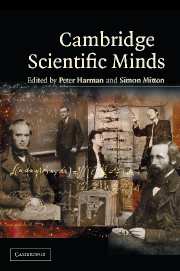Book contents
- Frontmatter
- Contents
- Foreword
- Introduction
- 1 William Gilbert
- 2 William Harvey
- 3 Isaac Newton: Creator of the Cambridge scientific tradition
- 4 William Whewell: A Cambridge historian and philosopher of science
- 5 Adam Sedgwick: A confident mind in turmoil
- 6 Charles Babbage: Science and reform
- 7 Charles Darwin
- 8 Stokes and Kelvin, Cambridge and Glasgow, light and heat
- 9 James Clerk Maxwell
- 10 The duo from Trinity: A.N. Whitehead and Bertrand Russell on the foundations of mathematics, 1895–1925
- 11 Thomson, Rutherford and atomic physics at the Cavendish
- 12 Hopkins and biochemistry
- 13 Charles Sherrington, E.D. Adrian, and Henry Dale: The Cambridge Physiological Laboratory and the physiology of the nervous system
- 14 Hardy and Littlewood
- 15 Arthur Stanley Eddington
- 16 Paul Dirac: A quantum genius
- 17 Alan Turing
- 18 Francis Crick and James Watson
- 19 Mary Cartwright
- 20 Joseph Needham
- 21 Molecular biology in Cambridge
- 22 The discovery of pulsars – prelude and aftermath
- 23 Stephen W. Hawking
4 - William Whewell: A Cambridge historian and philosopher of science
Published online by Cambridge University Press: 05 June 2014
- Frontmatter
- Contents
- Foreword
- Introduction
- 1 William Gilbert
- 2 William Harvey
- 3 Isaac Newton: Creator of the Cambridge scientific tradition
- 4 William Whewell: A Cambridge historian and philosopher of science
- 5 Adam Sedgwick: A confident mind in turmoil
- 6 Charles Babbage: Science and reform
- 7 Charles Darwin
- 8 Stokes and Kelvin, Cambridge and Glasgow, light and heat
- 9 James Clerk Maxwell
- 10 The duo from Trinity: A.N. Whitehead and Bertrand Russell on the foundations of mathematics, 1895–1925
- 11 Thomson, Rutherford and atomic physics at the Cavendish
- 12 Hopkins and biochemistry
- 13 Charles Sherrington, E.D. Adrian, and Henry Dale: The Cambridge Physiological Laboratory and the physiology of the nervous system
- 14 Hardy and Littlewood
- 15 Arthur Stanley Eddington
- 16 Paul Dirac: A quantum genius
- 17 Alan Turing
- 18 Francis Crick and James Watson
- 19 Mary Cartwright
- 20 Joseph Needham
- 21 Molecular biology in Cambridge
- 22 The discovery of pulsars – prelude and aftermath
- 23 Stephen W. Hawking
Summary
The inclusion in this volume of William Whewell, the historian and philosopher of science, may require some comment. Unlike Isaac Newton, Charles Darwin, or James Clerk Maxwell, he was not a major scientific discoverer and does not feature in any list of great scientific minds. On the other hand, however, as a person who lived in Cambridge from 1812 until his death in 1866, Whewell's connection with that place was arguably more continuing and deeper than that of many others who began their scientific lives there. I shall begin with this last point and then return to Whewell's contribution to the historical and philosophical understanding of science, one that fully justifies his treatment in this book.
Born the eldest son of a Lancaster master carpenter in 1794, Whewell attended Heversham Grammar School from 1810 in order to compete for a scholarship to Trinity College. He was successful and was formally entered at Cambridge in 1811, beginning his first term in October 1812 as a sub-sizar. From this time, although he kept in contact with his family in Lancaster, he rarely returned there, preferring to stay in Cambridge with his books and his new friends. In spite of the plague in Cambridge in the spring of 1815, he told his sister that he had decided to stay, because the trip home was expensive, and ‘because I can employ my time better here’.
- Type
- Chapter
- Information
- Cambridge Scientific Minds , pp. 51 - 63Publisher: Cambridge University PressPrint publication year: 2002



